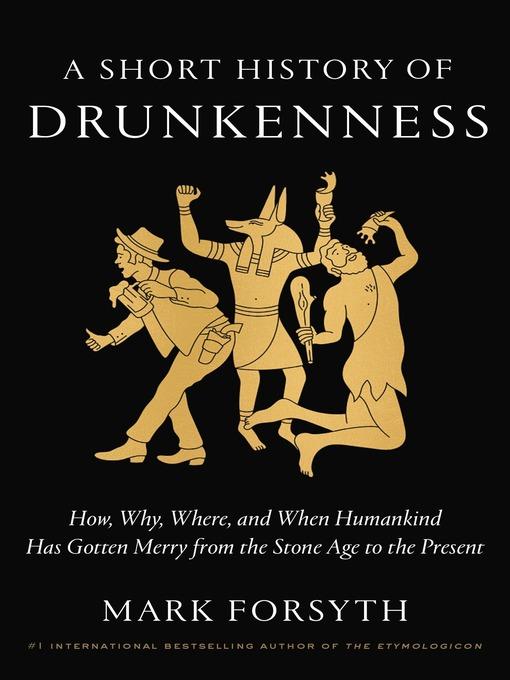
A Short History of Drunkenness
How, Why, Where, and When Humankind Has Gotten Merry from the Stone Age to the Present
کتاب های مرتبط
- اطلاعات
- نقد و بررسی
- دیدگاه کاربران
نقد و بررسی

March 5, 2018
Etymologist Forsyth (The Etymologicon) presents an entertaining jaunt through intoxication over the ages, from prehistoric times to Prohibition, with equal parts enlightening data and delightful color commentary. He takes readers on a tour of an ancient Sumerian tavern (where the law dictated that bartenders failing to give correct change would be executed), and elucidates the differences between inns, taverns, and alehouses in medieval London. He explores religious and cultural rituals related to drinking over the ages, including ancient Egypt’s orgiastic Festival of Drunkenness, the Greek symposium, and the Roman convivium, where one’s designated seat at the table spoke volumes about one’s social status. Forsyth quotes literary sources extensively, including The Epic of Gilgamesh, Beowulf, The Canterbury Tales, and Animal Farm, as well as both the Old and New Testaments. While some of the material covered will be familiar, Forsyth also includes some lesser-known details, like the provenance of the phrase “Dutch courage” and the history of the British “Rum Corps” in Australia. Forsyth’s clever sense of humor and flair for perceiving subtle historical ironies make for livelier and more amusing reading than any cold recitation of facts.

April 1, 2018
A popular history of getting soused.Language historian Forsyth (The Elements of Eloquence, 2014, etc.) assembles a brisk, witty, and roughly chronological précis on drinking cultures and practices around the world since the earliest fizzle of fermentation. Using humor to skim over the violence and sadness of alcohol abuse, the author specializes in snappy summaries and choice anecdotes about the weird and obsessive customs that people have created around the process of getting drunk, with more snark reserved for the teetotalers than the tipplers. Take the ancient Egyptians, who felt it their holy duty to imbibe and cavort to excess, one of many cultures that used alcohol as a means to spiritual elevation. While his coverage can be glib and occasionally unbalanced--he waxes on about Shakespeare's relationship to wine but distills millennia of Middle Eastern intoxication into the quip that, "For a Muslim, drinking is rarely simple"--Forsyth's rollicking sketches belie the extensive research that informs them. He offers a solidly embedded history, zooming in on the spaces and objects that have enabled and embodied inebriation across the ages. As with his work in etymology, this book showcases Forsyth's ability to make sense of the court records, wine songs, and snatches of poetry he finds in the textual slag heap. Not surprisingly, much of the story is bound up in religion and the law, and he leverages the anthropological distinction between "wet" and "dry" societies to explain, among other things, the close relationship between prohibitive legislation and widespread drunkenness. Forsyth's account is as ribald and casual as that of a teenage tour guide working for tips, but it's full of good history and good humor. This smart and satisfying generalist history will make you wish the author would sum up every other subject while you bob along the waves of his irreverent, learned wit (preferably with a drink in hand).The ideal companion for an idle hour, like one spent in an airport bar.
COPYRIGHT(2018) Kirkus Reviews, ALL RIGHTS RESERVED.

April 1, 2018
The publicity for this tough little book suggests you accompany it with a double shot of Old Mortality?presumably to feel at home with notable lushes of gone times, like Alexander the Great. That's a fine strategy, though we counsel moderation, lest you miss even a little of the insightful nuggets of pop-cultural history on view here. Forsyth, a British word addict, writes a bit like the late Kingsley Amis, and, like Amis, he loves trivia. He mentions the space-shuttle launches with the astronauts hiccup-and-happiness drunk. And he debunks beloved Hollywood lies: Robin Hood and his Merrie Men didn't drink in pubs because there weren't any then. And cowboy saloons didn't have batwing doors: they couldn't lock the place up if they did. He offers pretty convincing proof that Shakespeare was a wine drinker. But then the heavy stuff. Wine came along, for good or ill, with the spread of Christianity. And Confucius insisted on drink protocol for a reason that sounds a little sinister now: formal etiquette rigidly enforced will make people fall into line. Good fun for tipplers.(Reprinted with permission of Booklist, copyright 2018, American Library Association.)

























دیدگاه کاربران